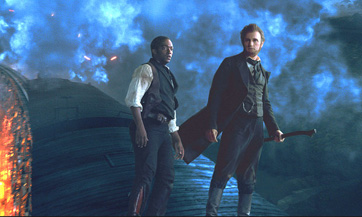Things I Learned From Movie X
Abraham Lincoln: Vampire Hunter
By Edwin Davies
July 4, 2012
BoxOfficeProphets.com

A house divided (by vampires) cannot stand
Holy shit, did you guys know that Abraham Lincoln hunted vampires in his spare time? I had no idea! I mean, I knew about the extracurricular activities of other presidents, such as Teddy Roosevelt penchant for hunting bears by the dozen, JFK’s famed skirt chasing abilities, and W.H. Taft’s professed love of travelling in the Adirondacks and hunting men for sport (though, owing to his considerable heft he never caught any, which is arguably the greatest tragedy of his life after that time he got stuck in a bathtub), but this information about Lincoln is news to me. Also, did you know that slavery used to be a thing?
In fact, before seeing the film, the only thing I knew about Lincoln was that he was called Honest Abe because he fessed up to chopping down an apple tree and spent many years in a Siberian prison camp for his admission. (Disclaimer: I have been known to mix up the life stories of different Presidents, as well as to mix up the lives of Presidents with those of characters in Dostoevsky novels.)
So, my interest piqued, I spent the nine hours after seeing the film watching all of Ken Burns' seminal series The Civil War, only to discover, to my disgust and horror, that there was not one mention of vampires in its entire running time. Coming from the foremost documentarian of our age, I find this omission to be shoddy, and downright disrespectful to the thousands who died to free this great nation from the claws of the Nosferatu. Next time you decide to spend the better part of a decade creating an epic tapestry of a crucial moment in American history, do some fucking research, Burns!
There is such a thing as being too prepared
So, to the plot: Abraham Lincoln (Benjamin Walker) spends his life waging a secret war against the vampires of America, led by Adam (Rufus Sewell), an unscrupulous one-percenter who (much like Donald Trump) swans around in a mansion whilst feeding on the effort and blood of the downtrodden masses, all the while denying them access to cheap, effective healthcare insurance other than the sweet release of death, which is the most comprehensive health plan going, if you think about it.
Their personal conflict becomes a national one once Lincoln is elected. Since the vampires have been using the slave trade as a means of maintained a steady food supply, putting an end to slavery would reduce their power and strike a killing blow against vampirism in America. As the war wages on, the vampires become more directly involved, and offer their services to Jefferson Davis at Gettysburg in the hopes of breaking the Union's military strength and ending the war. In retaliation, Lincoln orders that silver weaponry be made and shipped to Gettysburg on a train, which Adam and his subsequently cohorts attack.
What's important about this part of the story is not the train itself - the train is in reality a ruse, since the weapons are actually being transported over land by Mary Todd Lincoln (Ramona Flowers) along the Underground Railroad - but the way in which Adam attacks the train most certainly is. He and a handful of his acolytes board the train whilst it is in motion, doing battle with Lincoln and his friends. At the same time, another vampire, knowing the route that the train is going to take because it's on fucking rails and they know where it is going, runs ahead and sets fire to the one bridge that the train will have to cross, which in turn causes the bridge to collapse, giving Lincoln mere seconds to leap to safety as the train plunges through its smouldering supports.
Now, I don't want to tell anyone how to do their job, but it seems to me that boarding a train heading towards a bridge that you plan to destroy is overkill. Especially since all your plan aims to achieve is the destruction of said train, and maybe the death of your longtime rival, something which could be easily achieved by sending them hurtling into a fiery maelstrom of eternal hellfire in a train, and would do so without risking your own death in that self-same hellish inferno.
It's great that Adam thought ahead and came up with a plan B, but why couldn't he realise that it was the best Plan A imaginable?
Everything has to be a franchise nowadays
Once Abe has defeated both Adam and the Confederacy, he meets his friend Henry Sturgess (Dominic Cooper) in the Oval Office for a quick post-War tete-a-tete. Henry is, in fact, a vampire himself, a revelation that is in no way obvious from his first scene in the film, and he offers Lincoln the chance of immortality so that they can fight side by side throughout the ages. Abe refuses, says goodbye to his friend and mentor, then heads out to catch a performance of that delightful farce, Our American Cousin.
I ask you, dear readers: Why oh why must every Hollywood movie now end with such open-ended denouements designed only to leave the door open for sequels? You just know that the second film is going to start with Abe getting back from Ford's Theatre to discover that a bunch of werewolves or mummies have stolen the Liberty Bell or something. It’s an ending, frankly, lacks closure, and I’d have liked to have seen how Lincoln mopped up the remaining vampires in his second term, a term which, I assume, based on no historical knowledge, was uneventful and did not end tragically and prematurely.